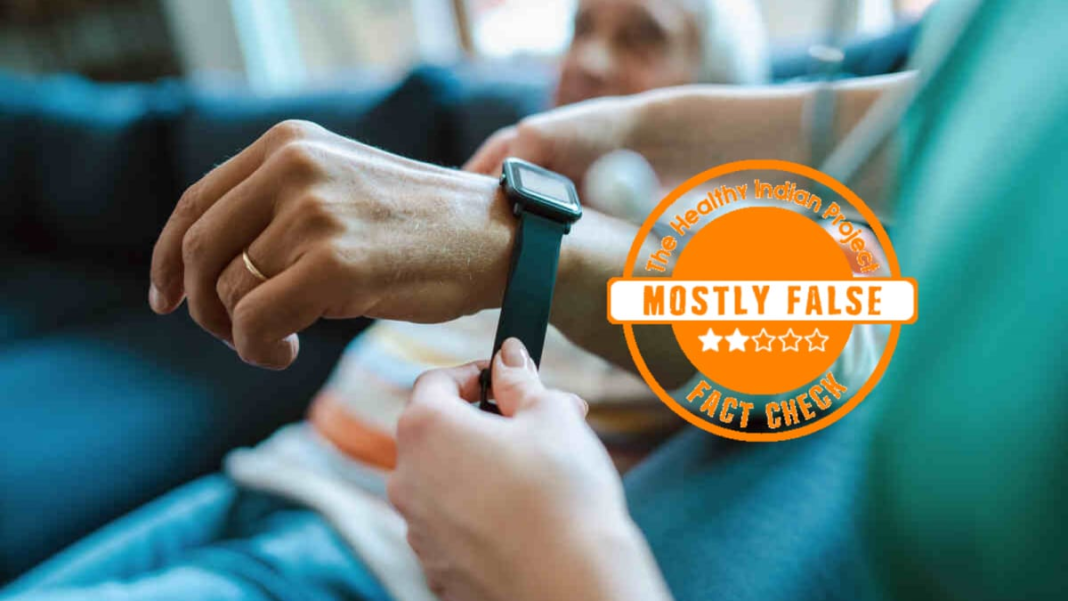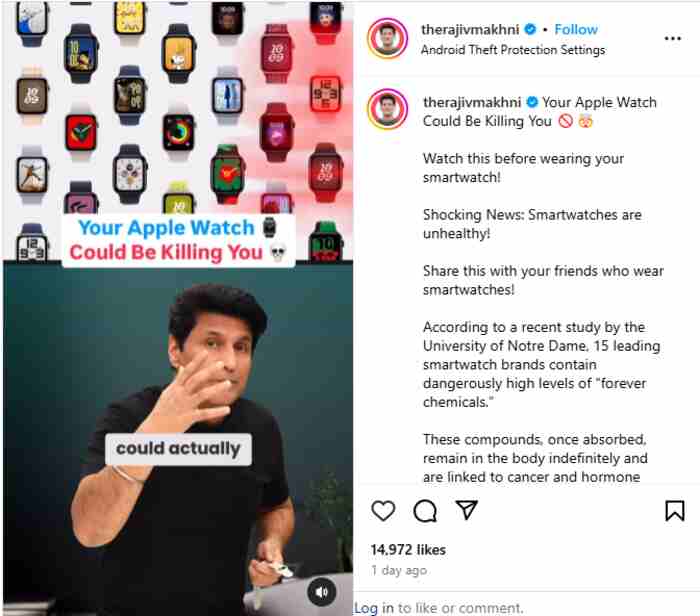Last Updated:
The claim that Apple smartwatches can cause cancer, liver damage, or hormone problems due to PFAS is mostly false. While some watch bands contain PFAS, the risk of harm through skin contact is low
There is no solid scientific evidence that wearing a smartwatch poses a serious health risk. (THIP Media)
A social media post claims that Apple smartwatches can cause cancer and other health issues. We did the fact check and termed this claim as mostly false.
The Claim
A viral Instagram video claims that Apple Watches can kill you. In the video, Rajiv Makhni further states that smartwatches, including Apple Watches, can cause cancer, liver damage, weakened immunity, and hormonal issues. The video blames “forever chemicals,” also known as PFAS (per- and polyfluoroalkyl substances), which are said to leach into the skin with regular wear.
Fact Check
Do smartwatches contain “forever chemicals” (PFAS)?
Yes, some do. A December 2024 study analysed 22 smartwatch bands from different brands. It found that 15 of them contained high levels of fluorine, suggesting the presence of fluoroelastomers, a type of synthetic rubber made using PFAS (Per- and polyfluoroalkyl substances). The most common PFAS detected was Perfluorohexanoic acid (PFHxA).
Fluoroelastomers make watch bands more durable, sweat-resistant, and flexible. However, not all smartwatch bands contain PFAS. Many bands are made from materials like silicone, leather, or fabric, which are PFAS-free.
Can PFAS from watch bands enter the body through the skin?
Unlikely to cause harm. PFAS can be harmful in large amounts, but skin absorption is not the primary way these chemicals enter the body. People are usually exposed to PFAS through contaminated food, water, or air. A study showed that PFHxA could be extracted from watch bands in a lab, but it’s unclear how much, if any, is absorbed through the skin in real-life conditions.
During our investigation, we found two studies on the skin absorption of PFAS:
- A 2022 study found PFAS in products that come into contact with the skin but highlighted that it’s unclear how much can be absorbed. More research is needed to understand PFAS skin absorption.
- A 2024 study found that the skin can absorb varying amounts of PFAS. Short-chain PFAS were absorbed more, with up to 59% of the applied dose passing through the skin. Longer-chain PFAS were absorbed much less, some as low as 0.1%. However, skin absorption was slow, and only small amounts reached the bloodstream over time.
Current scientific knowledge suggests that PFAS do not easily pass through the skin. The researchers from the study mentioned in the claim video also stated that we still need more studies to fully understand PFHxA’s skin absorption. Until then, claims about significant harm from skin contact remain unproven.
Are PFAS linked to cancer and other health problems?
Yes, in high amounts, but not from watch bands. Certain PFAS, like PFOA and PFOS, have been linked to cancer, hormone disruption, immune system issues, and liver problems. However, these health effects are associated with high levels of exposure, such as in industrial workers or people drinking contaminated water.
In contrast, the tiny amounts of PFAS that might come from watch bands are much lower than harmful exposure levels. There is no evidence that wearing a smartwatch increases PFAS levels in the body enough to cause health problems.
If you’re looking to minimise potential exposure, consider choosing less expensive wristbands made from silicone. For higher-priced options, carefully read product descriptions and avoid materials listed as fluoroelastomers.
Does the Notre Dame study actually state that smartwatches cause all those health problems?
Absolutely not. The study solely identifies the presence of PFHxA in some watch bands. It does not claim that wearing a smartwatch causes cancer, liver damage, or any of the other conditions mentioned in the video. The person in the video (Rajiv Makhni) is extrapolating significantly beyond the study’s actual findings.
To get an expert perspective, we spoke to Dr Sanjeev Kumar, MPH, Senior Consultant (Medical), NPCCHH (MoHFW), Centre for Community Medicine, AIIMS, New Delhi. He explained, “The Notre Dame study identifies the presence of PFHxA in some smartwatch bands but does not claim that wearing these devices causes cancer, liver damage, or other health problems. It highlights the need for more research on PFHxA exposure, especially through skin contact. However, detecting a chemical does not automatically mean it poses a health risk. Actual harm depends on factors like absorption levels, duration of exposure, and dose-response relationships, none of which the study directly addresses.”
Should people stop wearing smartwatches because of the health concerns?
Not really. Smartwatches offer health benefits like tracking heart rate, exercise, and sleep. There is no strong evidence that wearing them causes cancer or other health issues. If you’re concerned, consider using bands made from silicone, leather, or fabric.
While smartwatches can be useful for basic health monitoring, their accuracy has limitations. Prof. Dr Mayank Vats, Interventional Pulmonologist in Dubai, UAE, notes that “factors like skin tone, wrist positioning, and sweat can interfere with sensor readings for heart rate, blood oxygen, and ECG. This inaccuracy may mislead individuals with chronic conditions such as arrhythmia or hypertension, potentially delaying necessary medical intervention.”
Although smartwatches can help detect certain health issues, their capabilities are often misunderstood. They are helpful for general monitoring but have limitations, especially when it comes to managing chronic conditions.
THIP Media Take
The claim that Apple smartwatches can cause cancer, liver damage, or hormone problems due to PFAS is mostly false. While some watch bands contain PFAS, the risk of harm through skin contact is low. There is no solid scientific evidence that wearing a smartwatch poses a serious health risk.
This story was originally published by THIP Media, and republished by News18 as part of the Shakti Collective.


